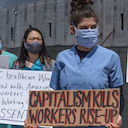
The Relational Economy
Both romantic and working relationships are under extraordinary pressure. Can we seize this moment to reclaim our hearts from our jobs?


Both romantic and working relationships are under extraordinary pressure. Can we seize this moment to reclaim our hearts from our jobs?

Once a major influence on Jair Bolsonaro, Olavo de Carvalho’s ambition is to establish a new right-wing, nationalist cultural hegemony in Brazil.

When our grief has structural causes, it can be the ground of struggle and a utopian political force.

Workers have been infuriated by the callous treatment they’ve received in their workplaces. Many of them recognized that the most surefire way to get their employers to provide the protection they needed was through collective action.

At each step, poor implementation has weakened the U.S. recovery effort.

The destruction and exploitation of non-human life has forced different kinds of animals into closer and closer contact with each other, increasing the likelihood that viruses like COVID-19 will emerge.

The evolution of information technologies will beckon us to expand the powers of governments, especially when we believe they would serve the common good, like during a pandemic. A bit of reflection should give us pause.

In the hardest-hit rural communities, the collective immune system was already fatally compromised. They were deep into a decades-old crisis when the pandemic arrived.

After weathering decades of disappointment, Hong Kongers understand that there is no tomorrow waiting. The future is not guaranteed, but must be won.

We’ve long heard about a decline in democracy. Canceled elections put this state of affairs into stark perspective.

The COVID crisis has cast into stark relief what has always been true: the wealth and prosperity of the U.S. economy rests on the labor, and the lives, of black and brown people.

We need a health system where the distribution of infrastructure and resources is not left to the dictates of the market, but rationally planned according to the needs of communities—and the certainty of future disasters.

The conservative response to COVID-19 has been defined by its heterogeneity: a blur of contradictory recriminations, confirmation biases, and conspiracy peddling.

Despite the outpouring of praise for essential workers during the COVID-19 pandemic, their own interests continue to come second to the broader public’s need for cheap and reliable labor.

As the 2008 financial crisis made clear, without major change at the European level, social democratic responses to the coronavirus crisis will be out of reach for many countries across the continent.